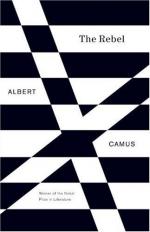
|
| Name: _________________________ | Period: ___________________ |
This quiz consists of 5 multiple choice and 5 short answer questions through Part 3, Section 6.
Multiple Choice Questions
1. What, according to the introduction of Part 3, is the "motivating principle of all revolutions"?
(a) Crime.
(b) Love.
(c) Freedom.
(d) Murder.
2. Human rebellion ends in what, according to Part 2's introduction?
(a) Historical rebellion.
(b) Nihilism.
(c) Metaphysical revolution.
(d) Hitlerism.
3. In Part 3, Camus states Junger thought it was better to be criminal than what?
(a) Poor.
(b) Powerful.
(c) Bourgeois.
(d) Religious.
4. According to Part 3, what are the two contemporary forms of nihilism?
(a) State and national.
(b) Individual and national.
(c) Local and state.
(d) Individual and state.
5. The ancients, according to Part 2, believed rebelling against nature was the same as rebelling against what?
(a) Government.
(b) Satan.
(c) Oneself.
(d) God.
Short Answer Questions
1. What type of temple does Camus say nihilism builds in Part 3?
2. What concept does Nietzsche encounter?
3. According to Camus in Part 1, every rebellion invokes what?
4. What does Camus say is the homage the "malignant recluse finally pays to the brotherhood of man" in Part 3?
5. The only salvation lies in what, according to Part 3?
|
This section contains 172 words (approx. 1 page at 300 words per page) |

|




